
The Lost Weekend is a 1945 American drama film noir directed by Billy Wilder, and starring Ray Milland and Jane Wyman. It was based on Charles R. Jackson's 1944 novel about an alcoholic writer. The film was nominated for seven Academy Awards and won four: Best Picture, Best Director, Best Actor, and Best Adapted Screenplay. It also shared the Grand Prix at the first Cannes Film Festival, making it one of only three films—the other two being Marty (1955) and Parasite (2019)—to win both the Academy Award for Best Picture and the highest award at Cannes.

The Apartment is a 1960 American romantic comedy film directed and produced by Billy Wilder from a screenplay he co-wrote with I. A. L. Diamond. It stars Jack Lemmon, Shirley MacLaine, Fred MacMurray, Ray Walston, Jack Kruschen, David Lewis, Willard Waterman, David White, Hope Holiday and Edie Adams.

Billy Wilder was an American filmmaker and screenwriter. He was born in Sucha Beskidzka, Poland, a town in Austria-Hungary at the time of his birth. His career in Hollywood spanned five decades, and he is regarded as one of the most brilliant and versatile filmmakers of Classic Hollywood cinema. He received seven Academy Awards, a BAFTA Award, the Cannes Film Festival's Palme d'Or and two Golden Globe Awards.
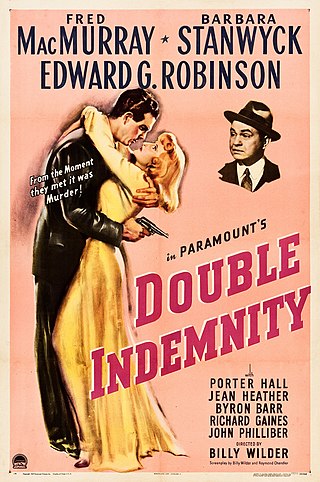
Double Indemnity is a 1944 American film noir directed by Billy Wilder and produced by Buddy DeSylva and Joseph Sistrom. Wilder and Raymond Chandler adapted the screenplay from James M. Cain's novel of the same name, which ran as an eight-part serial in Liberty magazine in 1936.

Sunset Boulevard is a 1950 American black comedy film noir directed by Billy Wilder and co-written by Wilder and Charles Brackett. It is named after a major street that runs through Hollywood.

Quo Vadis is a 1951 American religious epic film set in ancient Rome during the final years of Emperor Nero's reign, based on the 1896 novel of the same title by Polish Nobel Laureate author Henryk Sienkiewicz. Produced by Metro-Goldwyn-Mayer and filmed in Technicolor, it was directed by Mervyn LeRoy from a screenplay by S. N. Behrman, Sonya Levien, and John Lee Mahin. It is the fourth screen adaptation of Sienkiewicz's novel. The film stars Robert Taylor, Deborah Kerr, Leo Genn, and Peter Ustinov, and features Patricia Laffan, Finlay Currie, Abraham Sofaer, Marina Berti, Buddy Baer, and Felix Aylmer. Future Italian stars Sophia Loren and Bud Spencer appeared as uncredited extras. The score is by Miklós Rózsa and the cinematography by Robert Surtees and William V. Skall. The film was released by Metro-Goldwyn-Mayer on November 2, 1951.
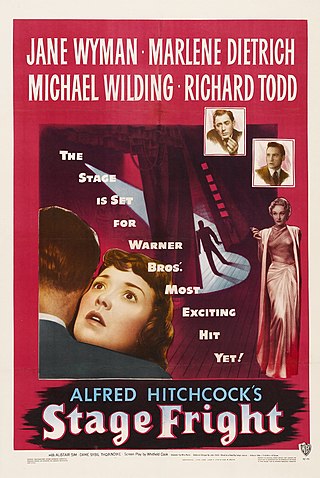
Stage Fright is a 1950 British thriller film noir directed and produced by Alfred Hitchcock and starring Jane Wyman, Marlene Dietrich, Michael Wilding and Richard Todd. The cast also features Alastair Sim, Sybil Thorndike, Kay Walsh, Hitchcock's daughter Pat Hitchcock in her film debut, and Joyce Grenfell in a vignette.

Dame Frances Rosemary Walsh is a New Zealand screenwriter and film producer.

Out of Sight is a 1998 American crime comedy film directed by Steven Soderbergh and written by Scott Frank, adapted from Elmore Leonard's 1996 novel of the same name. The first of several collaborations between Soderbergh and actor George Clooney, it was released on June 26, 1998.

I. A. L. Diamond was a Romanian–American screenwriter, best known for his collaborations with Billy Wilder.

Miklós Rózsa was a Hungarian-American composer trained in Germany (1925–1931) and active in France (1931–1935), the United Kingdom (1935–1940), and the United States (1940–1995), with extensive sojourns in Italy from 1953 onward. Best known for his nearly one hundred film scores, he nevertheless maintained a steadfast allegiance to absolute concert music throughout what he called his "double life".

The Grifters is a 1990 American neo-noir crime thriller film directed by Stephen Frears, produced by Martin Scorsese, and starring John Cusack, Anjelica Huston, and Annette Bening. The screenplay was written by Donald E. Westlake, based on Jim Thompson's 1963 novel of the same name. The film won the Independent Spirit Award for Best Film and was declared one of the Top 10 films of 1990 by The National Board of Review of Motion Pictures.

Sir Stephen Arthur Frears is a British director and producer of film and television, often depicting real life stories as well as projects that explore social class through sharply-drawn characters. He has received numerous accolades including three BAFTA Awards, and a Primetime Emmy Award as well as nominations for two Academy Awards. In 2008, The Daily Telegraph named Frears among the 100 most influential people in British culture. In 2009, he received the Commandeur de l'Ordre des Arts et des Lettres. He received a knighthood in 2023 for his contributions to the film and television industries.
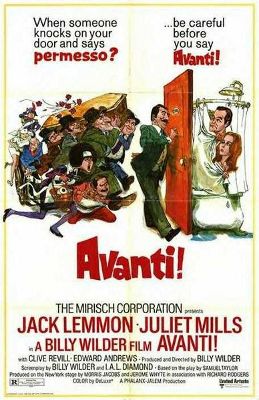
Avanti! is a 1972 American/Italian international co-production comedy film produced and directed by Billy Wilder, and starring Jack Lemmon and Juliet Mills. The screenplay by Wilder and I. A. L. Diamond is based on Samuel A. Taylor's play, which had a short run for the 1968 Broadway season. The film follows a businessman attempting to deliver the body of his father from Italy. It premiered on December 17, 1972. Lemmon won the Golden Globe Award for Best Actor – Motion Picture Musical or Comedy. The film was nominated for five Golden Globe Awards, including Best Motion Picture – Musical or Comedy, Best Director, Best Actress – Motion Picture Comedy or Musical, and Best Screenplay.

Love in the Afternoon is a 1957 American romantic comedy film produced and directed by Billy Wilder, and starring Gary Cooper, Audrey Hepburn and Maurice Chevalier. The screenplay by Wilder and I.A.L. Diamond is based on the 1920 Claude Anet novel Ariane, jeune fille russe. The story explores the relationship between a notorious middle-aged American playboy business magnate and the 20-something daughter of a private detective hired to investigate him. The supporting cast features John McGiver and Lise Bourdin.
"In Camelot" is the 59th episode of the HBO original series The Sopranos and the seventh of the show's fifth season. Written by Terence Winter and directed by Steve Buscemi, it originally aired on April 18, 2004.
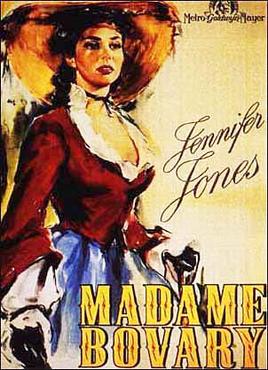
Madame Bovary is a 1949 American romantic drama, a film adaptation of the classic 1857 novel of the same name by Gustave Flaubert. It stars Jennifer Jones, James Mason, Van Heflin, Louis Jourdan, Alf Kjellin, Gene Lockhart, Frank Allenby and Gladys Cooper.
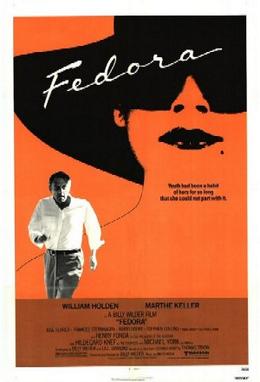
Fedora is a 1978 German-French drama film directed by Billy Wilder and starring William Holden and Marthe Keller. The screenplay by Wilder and I.A.L. Diamond is based on Tom Tryon's novella in the collection Crowned Heads.

Ariane Labed is a Greek-French actress and film director. She is known for her feature film debut in Attenberg, for which she won the Volpi Cup for Best Actress, and appearing in Helen Edmundson's film Mary Magdalene in 2018.

Ariane is a 1931 German drama film directed by Paul Czinner and starring Elisabeth Bergner, Rudolf Forster and Annemarie Steinsieck. It is an adaptation of the 1920 French novel Ariane, jeune fille russe by Claude Anet. Two alternative language versions The Loves of Ariane and Ariane, jeune fille russe were made at the same time. The film was the inspiration of the 1957 Billy Wilder film Love in the Afternoon. Wilder remembered the film as "touching and funny". It was shot at the Staaken Studios in Berlin. The film's sets were designed by the art directors Erich Zander and Karl Weber. Location shooting took place in Paris.



















